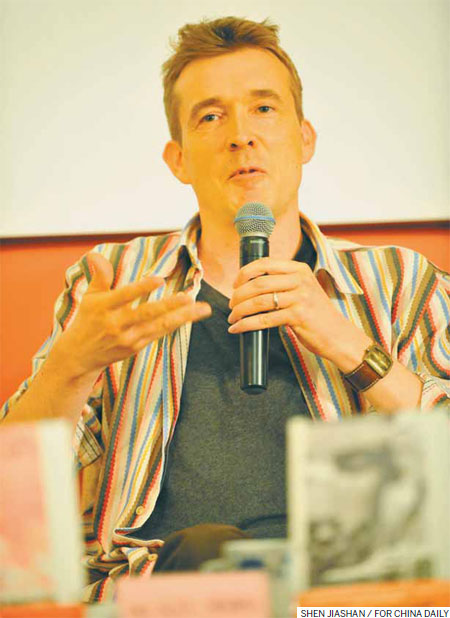Truer than truth
Updated: 2012-09-11 09:59
By Zhang Kun (China Daily)
|
|||||||||||
 |
|
David Mitchell explains his modus operandi at a forum in Shanghai on building a 'House of Fiction'. Zhang Kun was there. |
The British author David Mitchell has presented such ambition, depth and vision - rarely seen in contemporary Chinese writers - that Shanghai Literature and Art Publishing Group has published four of his books in Chinese, while a fifth is being translated.
During his first visit to Shanghai, Mitchell had a public dialogue with Chinese writer Su Tong, in front of a full house.
In the dialogue, with the theme of "How to Build a House of Fiction", Su compared Mitchell's work to Lego, as he magically puts together many seemingly random elements to create a book.
"There is no limitation of time or space to his imagination," Su says.
Mitchell, 43, has published five novels and his most acclaimed work is Cloud Atlas. The multi-award winning novel tells six stories, from the mid 1800s to the post-apocalyptic future.
Mitchell listed the basic materials to build a house of fiction: the story, characters, structure, style, and then on top, the theme, or idea of the book. While a writer builds his house of fiction, readers enter a world of imagination, where writers tell lies that are truer than truth, Mitchell says.
"My mother used to know a woman who was a fundamentalist and refused to read novels because they were fictional, but she read The Sun (UK tabloid) and believed it was true."
Unlike science, creative writing is immune to the rules about how the world works, as you can always find exceptions and an opposite example to any rule about writing.
Mitchell says of how he starts a work: "You make a character basically likable to readers, and then you make readers believe bad things are going to happen to him, and make them worry about his destiny."
This seems simple enough, but in Cloud Atlas, he adopts a complicated structure where each story is presented as a tale/journal/happening that was read or observed by the main character of the next story.
Each story stops abruptly halfway, followed by the first half of the next story. The stories interlock in this way, till midway through, when they wrap up, one after another, till all of them reach the conclusion.
Cloud Atlas won the British Book Awards Literary Fiction Award in 2004, and was adapted into a movie directed by Tom Tykwer and the Wachowskis (who directed The Matrix trilogy), and starring Tom Hanks, Halle Berry and Hugh Grant, as well as Chinese actress Zhou Xun. It is scheduled to be released in October.
Mitchell believes the movie adaptation focuses on the "reincarnation" concept in the original book, and was "translated" rather than "adapted" into a movie.
Although it takes much more effort to make a movie than to write a book, reading books can be a more profound experience, he says.
He says he read War and Peace during a train journey from Beijing to Mongolia and then Russia, and "the fictional Russia seemed larger than reality itself".
Mitchell once lived and worked as an English teacher for many years in Japan, and married a Japanese woman. He says many things have inspired him, aside from his life experiences.
"Dream, films, aliens, outer-space, everything has the potential for 100 good stories in it."
While Chinese author Su Tong believes reading on digital devices deprives people of the ceremonial sense of reading on paper, Mitchell says he agrees that "the screen is for information and paper for art, but as long as I get paid I wouldn't mind if people read my books on a cow".
Digital content is so easily accessible nowadays that "young people may just assume books to be free, and are not ready to pay for it, just like what's happened to the music industry", the author says.
Mitchell published his first novel, Ghostwritten, in 1999, followed by number9dream, Cloud Atlas, Black Swan Green and The Thousand Autumns of Jacob de Zoet.
All these books are published in Chinese, except for number9dream, which is still being translated.
"We aim to introduce a kind of dialogue between Chinese and foreign authors, and we found his writing to be of such great depth and width - unmatched in today's Chinese literary scene," says Cao Yuanyong, editor of the Chinese editions.
Shanghai Literature and Art Publishing Group has a lot of experience publishing contemporary Chinese work, but only ventured into the field of foreign literature in recent years.
"Many modern masters have been translated into Chinese but little do Chinese readers know of Western writers born in the 1960-70s," Cao says. "We believe by introducing these writers' works, we can somehow bring new insight and influence to contemporary Chinese writers."
Related Stories
The dragon befriends the springbok 2012-09-10 14:29
Famous teddy bear dolls 2012-09-07 14:11
My 30 Years with Lang Lang 2012-09-04 15:13
'This Generation' literature series 2012-09-04 15:08
Today's Top News
Rescuers race against time for quake victims
Telecom workers restore links
Coal mine blast kills 18 in Jilin
Intl scholarship puts China on the map
More bird flu patients discharged
Gold loses sheen, but still a safe bet
US 'turns blind eye to human rights'
Telecom workers restore links
Hot Topics
Lunar probe , China growth forecasts, Emission rules get tougher, China seen through 'colored lens', International board,
Editor's Picks

|

|

|

|

|

|





